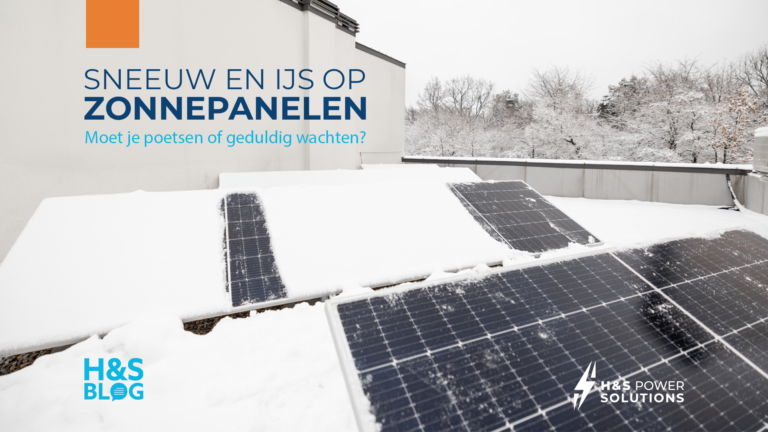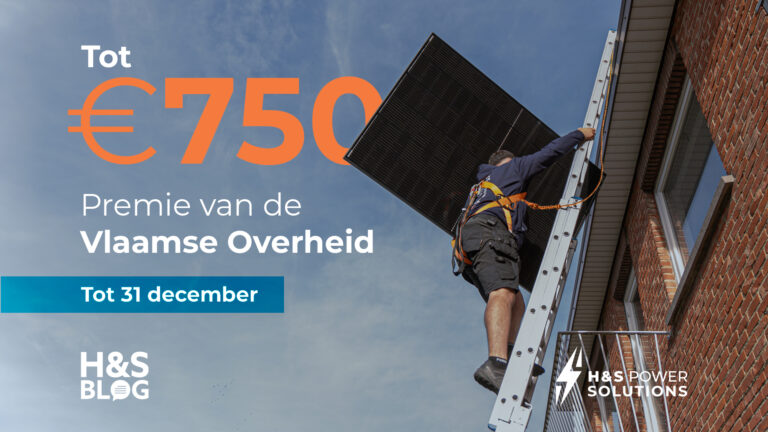Solar panels generate the most power during the day, with peak hours between 11 am and 3 pm. But many families are working then or simply not at home. As a result, much of their generated solar energy is injected back into the grid. Do you recognize yourself in this? Then a home battery might be an interesting solution for you! We know; a home battery is not a cheap investment. But it is one that can make all the difference in the long run and significantly reduce your payback on your PV installation. Below we explain why.
What does a home battery do?
In short, it stores excess solar energy from your solar panels so you can use it at a later time. During the peak hours of your solar panels, they may be producing more power than you need at that time. With a home battery, the excess is simply stored so you can get even more energy from your solar panels.
Solar panels send their generated energy to the inverter, which converts the solar energy to usable energy, which in turn passes this power to your home battery. You obviously cannot install a home battery if you do not have solar panels and inverter.
Your distribution network costs drop
On average, a family consumes only 30% of their self-generated solar energy. The rest of it goes back to the grid. With a home battery, that self-consumption is increased to an average of 70% and in the best cases up to 80%! This means that with a home battery, you become even more independent of the grid because you can use more energy from your own solar panels.
But also at times when your solar panels produce less for a while such as e.g. At night or on cloudy days, you can still use your own stored solar energy with a home battery. You can store your energy in the battery for several hours or even several days, depending on how much you consume. This makes you even less dependent on expensive grid power.
More flexibility
With a home battery, you are not required to consume the power from your solar panels immediately. You no longer have to adjust your energy consumption to the times when your solar panels are producing the most. This way, you yourself have a little more flexibility and self-determination over your energy, in other words, you can better spread your energy consumption throughout the day, which is more comfortable.
Avoiding peak moments
With the new capacity tariff, grid power will become more expensive during peak hours starting in 2023. Traditional peak hours in energy consumption are between 7 p.m. and 11 p.m. on weekdays. The introduction of the capacity tariff will mean that when you use many appliances at once, the energy will cost more. With a home battery, you are protected from these more expensive energy prices because you consume your own energy. At these hours, you simply use the energy then in your home battery, which means you need much less of that expensive grid power.
Did you know: When you purchase or lease a home battery, you are entitled to a premium from Fluvius. However, the premium will end on March 31, 2023.
Additional security
It may well happen that on your street the mains power is temporarily cut. But with solar panels and a home battery, you can continue your activities worry-free. In this case, your home battery acts as an emergency generator for your home appliances. Your frozen and frigo-stuff won’t suffer from those power outages either.
Moreover, energy prices have been very volatile over the last year. A home battery ensures that you consume as much of your own solar energy as possible because the excess energy from your solar panels is not lost to the grid.
Conclusion: a home battery is not a cheap investment and will not be equally profitable for every family situation. Therefore, weigh the pros and cons carefully before making a decision. However, now is the appropriate time to invest in this. Then you are protected from the capacity fee.
The benefits of a home battery once again:
- Storing excess energy from your own solar panels
- Less offtake of grid power and lower distribution grid costs
- Protection against capacity charge
- More flexibility in your self-consumption
- Additional security during power outages
- Better protected against rising energy prices




